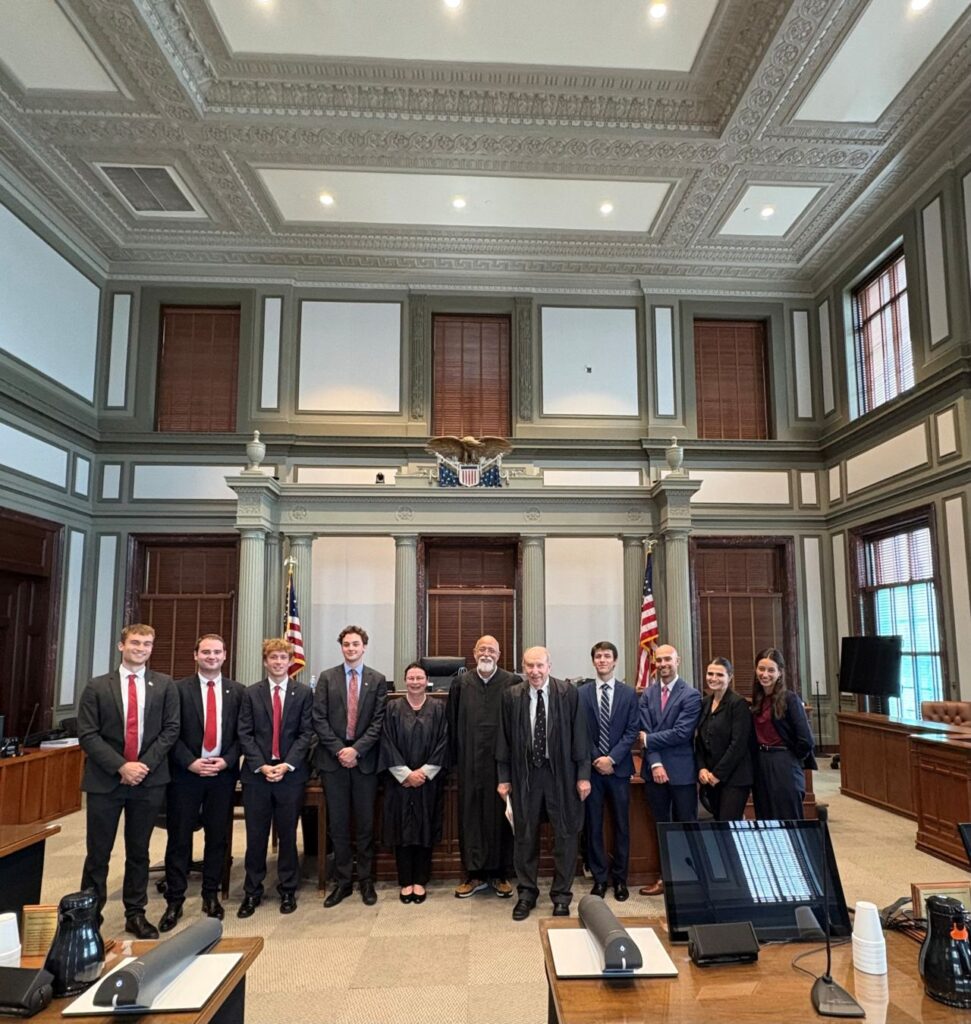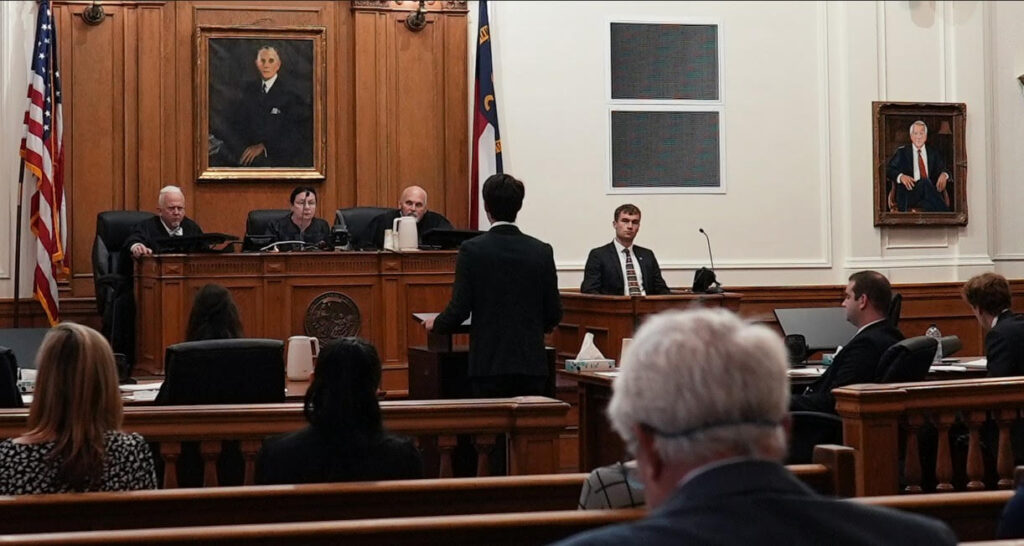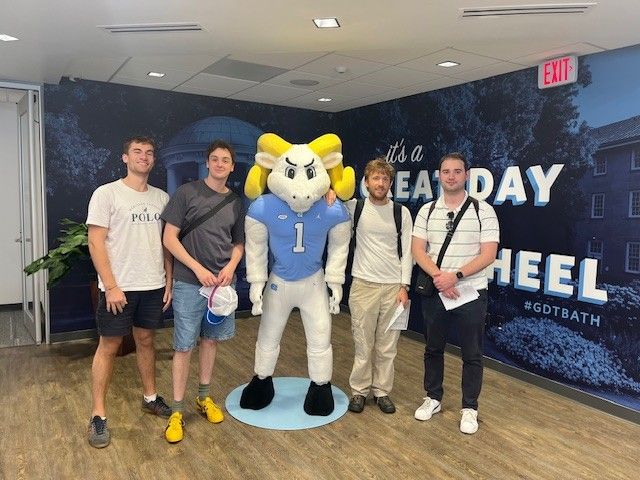On statutes and southern hospitality (and mooting)

Does a prison van count as “prison premises”? Does headbutting a prison guard constitute “overthrowing” his lawful authority? These two questions proved a fruitful source of argument for Edward O’Connor, who had the opportunity to travel to the University of North Carolina last month, along with three other Middle Temple mooters, who had reached the semi-finals of the Inn’s long-running Rosamund Smith moot. Here’s a brief insight into the trip and the moot itself.
Forty-eight years ago this Tuesday, Megarry VC gave judgment on a narrow point of local government law.[1] He began his speech with this rueful observation which still resonates: “This case turns on a short point of statutory construction. I have not found it altogether easy.”[2] In more recent times another “short point of statutory construction” cropped up in the Court of Appeal where it was decided unanimously,[3] only to be overturned in short order by bare majority of a conflicted Supreme Court.[4] Just a few months ago the hotly-debated[5] matter of the public right to wild camp on Dartmoor was judged to raise a “short point of statutory construction” by the Master of the Rolls who began his speech in almost identical terms as had Megarry VC.[6] Perhaps there is no problem capable of generating lengthier argument than that most tantalising of things – a ‘short point of statutory construction’.

This moot raised two of them. The (imagined) facts consisted of a broken-down prison van containing several fed-up occupants who kicked at their captors and refused to move. The offence charged was prison mutiny,[7] a statutory offence committed when prisoners engage in conduct, on prison premises, intending to advance a common purpose of overthrowing the prison’s lawful authority. The moot points were: (i) whether the stricken van constituted “prison premises”; and (ii) whether the prisoners’ behaviour evinced the intention to “overthrow” the prison’s authority.
These two questions proved a fruitful source of argument as I and three other Middle Templars mooted them against law students from the University of North Carolina last month. The trip involved a series of moots at different courthouses around the State over the course of a week. It also featured a college volleyball game, a beach trip, and numerous expensive trips to the university merchandise store.

Each excursion proved more interesting than the last, but we were particularly grateful for the opportunity to test our oral submissions against a gleeful torrent of judicial interrogation from various masters of Middle Temple, a federal district judge, and members of the local North Carolinian bar.
A lecture of the university constitutional law society also made for interesting viewing, and we revelled in the generosity of our hosts who fed and watered us (copiously) in Southern style during the week we spent with them. The exchange was the prize for reaching the later stages of the Rosamund Smith Moot.
I was first introduced to mooting last year on the 4 New Square moot while studying on the GDL at City. I have since enjoyed competing in competitions organised by City, various chambers, and the Inn.

I would thoroughly recommend mooting to beginners, both as great advocacy practice and great fun. I would particularly recommend (to those at Middle Temple) the Rosamund Smith Moot, for which applications this year are open until the 10th of November. I would finally like to thank my brilliant moot partner Michael Freeman and the wonderful director of education at Middle Temple, Christa Richmond, for such a fantastic trip.
Edward O’Connor studied at the City Law School on the GDL last year, having previously read music at Gonville & Caius College, Cambridge. He is now undertaking the Bar Course and will begin pupillage at 11KBW in September next year.
[1] Hopson v Devon CC [1978] 1 WLR 553. The question was whether a district councillor sitting on a county council committee counted as a county councillor within the meaning of s.177(3) of the Local Government Act 1972, so as to be entitled to an attendance allowance under s.173(1). As it turned out, the answer is no.
[2] At 554.
[3] R (Privacy International) v IPT [2017] EWCA Civ 1868, per Sales LJ at [24].
[4] R (Privacy International) v IPT [2019] UKSC 22. The divisional court was also split, though Leggatt J concurred to allow the case to proceed upwards ([2017] EWHC 114 (Admin), at [62]).
[5] See Sophie Gibson, “Competing ‘Clear and Unambiguous’ Constructions […]” (2023) JR 28(4), 298; and Antonia Layard, “Darwall and the Public Life of Private Property”, (2025) UK Constitutional Law Blog, linked.
[6] Darwall v Dartmoor NPA [2023] EWCA Civ 927, per Vos MR at [1]; upheld unanimously on appeal ([2025] UKSC 20).
[7] Contrary to section 1(2) of the Prison Security Act 1992.
